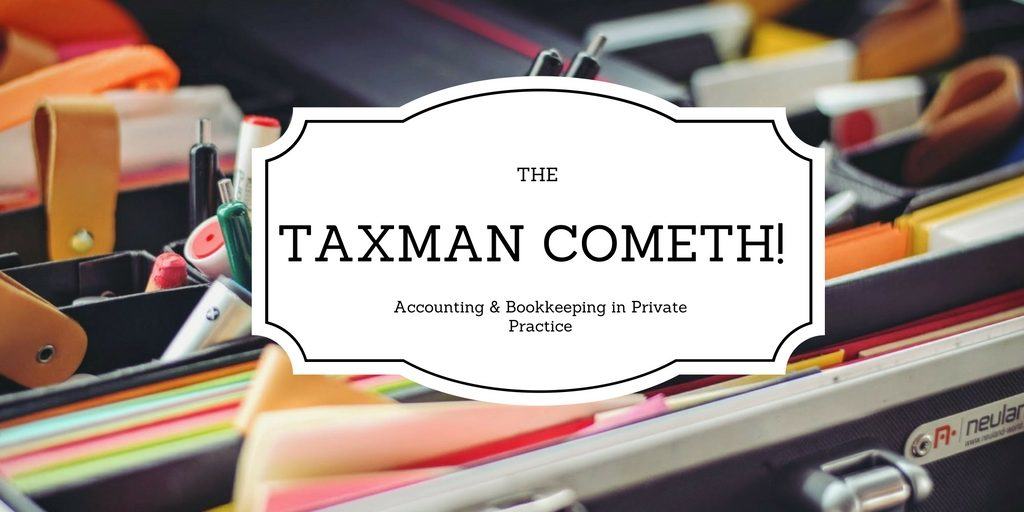 As the year comes to an end and the New Year starts, a lot of us start thinking about taxes and doing our tax returns. First of all, I am NOT a tax expert. But as a small business owner and a clinician in private practice, it is something that I have tried to stay on top of and understand. And you should too!
As the year comes to an end and the New Year starts, a lot of us start thinking about taxes and doing our tax returns. First of all, I am NOT a tax expert. But as a small business owner and a clinician in private practice, it is something that I have tried to stay on top of and understand. And you should too!
Unless you had some coursework as an undergraduate in accounting or bookkeeping, most of us in the mental health fields have had little to no education or training on those subjects. I know that was true for me. I do well just to keep my checkbook balanced! Some basic accounting practices and knowledge was something I had to learn.
First of all, I would HIGHLY recommend that you talk to an accountant or other financial professional to learn what is required as a small business owner in your state. State tax laws can vary and how you need to track and keep records may differ as well.
The Basics
As a private practice and small business owner, you will need to track and keep records that show what you have taken in (income) and what you have spent (expenses) for your business. This is not only a good business practice, the IRS requires it if you are going to take tax deductions for your business expenses. Here are some basic terms and concepts:
Income– is what people pay you for your services. Income can also come from any products you might sell, like books or other materials in your business (also known as “gross income”).
Expenses – also sometimes referred to as “overhead” are things that you have to buy or payout in order to run your business. These are things like rent, office supplies, office equipment, phone and utility expenses. (What you pay yourself is NOT an expense)
Equity– is money you have invested in your business. This is part of your business assets.
Profit – is your income minus your expenses. This is also referred to as “net income”.
Draw – sometimes referred to as “owner’s draw”(“member’s draw” if you have formed an LLC) is the money you pay yourself from the business(salary). Typically this comes out of the profit or net income you make from your business. Any profit your do not pay to yourself, then becomes part of the equity.
Profit and Loss Statement – is simply a statement or report that outlines your income vs. expenses.
Balance Sheet – is a statement or report that outlines your assets, liabilities and equity in business.
So here are some basic tips and things to know when it comes to accounting, taxes and bookkeeping when you are in private practice as a counselor or therapist.
Keep your clinical records separate from your accounting records
In addition to your accounting records, you are going to need a system in place to keep your clinical records. Clinical records typically contain personal health information (PHI). So with this you need to be aware of being HIPAA secure and have that information protected. This would also mean protecting it from your accountant. Part of the clinical record would be what the client pays you for their session. The tip here is that you will need have a separate accounting and bookkeeping system that does not contain PHI. In that system you would simply record that you were paid by a client, but not specify who that client is.
Again you can go with something as simple and low tech as paper records. But I would suggest that you do consider and recommend that you keep your clinical records electronically. As you grow, you will probably want to invest in a practice management system that has some accounting capabilities. These will help you track individual clients and what they have paid you and what they owe for their sessions. What most of the practice management systems do not have is a way to track your business expenses. This is another reason why you will need to use a separate accounting system for your tracking your business income and expenses.
Get a Tax ID number for your private practice
If you do not have one already, get a separate Tax ID number for your practice. This is also known as an EIN (employee identification number). Even though you do not necessarily have employees, this is the number can be used to identify you without having to use your Social Security Number. DO NOT use your social security number. You can get that from the IRS for free.
Keep your practice and personal records separate
One of the first things my accountant told me when I started my private practice was to open a separate checking account that was specifically for my business. Use this checking account to deposit all the fees you collect and write all the checks for expenses. This will keep your accountant and the IRS happy.
Record and track everything
Bookkeeping is simply a system of recording and documenting the money that comes in (income) and what money is spent (expenses) for the practice. When it comes to keeping records,it is important to put a consistent and accurate system in place to record and track things.
There are several ways to do this. You might simply set up a spreadsheet to track things. You could also use an “old school” paper accounting journal. Either one will work. But I have found that using an accounting application or software is well worth the investment.
An accounting application that comes highly recommended is Freshbooks. It is really designed for small businesses and would be a good app to start with. It is cloud based, so you can access it from anywhere. It not only tracks your income and expenses, but allows you to print invoices and send bills. It also has a way to integrate credit card payments.
Another one to consider is QuickBooks. I started using Quickbooks early on. Most accountants are familiar with Quickbooks and it also comes highly recommended. It might be a little pricey for those just starting out (about $200-$300 per year) It is complete package. It tracks everything and allows your to do invoices, billing and write checks. It also has the ability to produce reports and give you financial analyses.
Keep your receipts
This may or may not be obvious, but if you buy anything that you are using for your business from business cards, paper, printer ink to computers, you can take a deduction on your taxes for those legitimate business expenses. Be careful though not to go overboard with taking deductions. If you were ever audited, you need to be able to justify how it is a business expense. (No you cannot just go to dinner with your spouse and write it off as a business expense!) Again, check with an accountant on this.
Pay your Taxes!
One thing that many people going into private practice do not realize is that you do have to pay self-employment taxes. This is usually paid quarterly to the IRS. Again check with an accountant on this, but self-employment tax is typically about 18 to 20% of your net income depending on the state that you live in. And so you will need to save this amount to have to pay each quarter. Otherwise you can get dinged at the end of the year, have a large tax bill waiting plus potential audits from the IRS.
Stay on top of your bookkeeping
Another thing I highly recommend is that you stay on top of your bookkeeping and accounting throughout the year. The accounting and bookkeeping tools are great to have, but you do need to enter your income and expenses regularly. Once you get things set up, it should only take you a few minutes each day to enter things. Believe me, if you don’t stay on top of it, it can get confusing and hectic come tax time. By adopting some good accounting habits and knowledge early on will just make your private practice more successful.
Certainly this is not all of the information you will need to run your private practice from the accounting side of things. And as has already been mentioned DO SEEK THE ADVICE OF A PROFESSIONAL AS YOU SET THINGS UP. Once you set things up, it becomes easy to manage and understand.
 By L. Gordon Brewer, Jr., MEd. LMFT – Gordon is the President and Founder of Kingsport Counseling Associates, PLLC. He is also a consultant and business mentor at The Practice of Therapy. Follow us on Twitter @therapistlearn. Join the Facebook Group.
By L. Gordon Brewer, Jr., MEd. LMFT – Gordon is the President and Founder of Kingsport Counseling Associates, PLLC. He is also a consultant and business mentor at The Practice of Therapy. Follow us on Twitter @therapistlearn. Join the Facebook Group.




